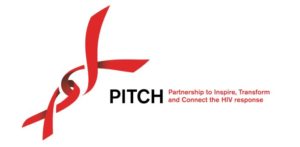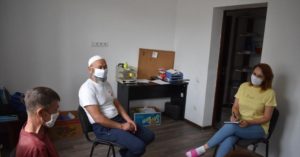 2020 is the last year of implementation of the PITCH project – the Partnership to Inspire, Transform and Connect the HIV response which supports community-based organisations to uphold the rights of populations most affected by HIV and engage in effective advocacy, generate robust evidence and develop meaningful policy solutions.
2020 is the last year of implementation of the PITCH project – the Partnership to Inspire, Transform and Connect the HIV response which supports community-based organisations to uphold the rights of populations most affected by HIV and engage in effective advocacy, generate robust evidence and develop meaningful policy solutions.
 AFEW International spoke with Dina Masalimova, project manager of AFEW Kyrgyzstan, one of the implementers of the project in Bishkek, and asked about results and latest successes.
AFEW International spoke with Dina Masalimova, project manager of AFEW Kyrgyzstan, one of the implementers of the project in Bishkek, and asked about results and latest successes.
Dina, on October 1, 2019 the PITCH Project launched the first round of a grant program for civil society organizations. How did you select the organizations and which activities did they implement?
By now we have launched two rounds of the mini-grant program within the PITCH Project. One round started in October 2019 and is completed by now. The second round was launched in summer 2020. By now we have awarded 5 mini-grants and two more contracts will be signed in September. The priorities for the calls of proposals were selected together with the municipal authorities and in close consultations with the community. For example, in July 2020 we had a round of consultations with a wide range of community-based organizations in Bishkek who helped us identify their advocacy needs and design the program. The selection process was implemented by the Grant Committee which included representatives of the community and donor partners.
Which activities were implemented within the PITCH grant program by local civil society organizations?
First of all, we had HIV mini sessions for the municipal authorities. The sessions were based on the preliminary approved City HIV Programme. As you know last year Bishkek signed the Paris Declaration and joined the Fast Track Cities Initiative. It was an important step to start engaging local authorities into the HIV prevention programming. One of the first steps was to widely inform the municipal officials on HIV. We reached more than 500 municipal officials with information about HIV and what their role is in preventing it in the city. For many of the officials it was the first time they were given reliable information about HIV presented by the doctors and peers.
 Also, capacity building workshops were organized for the emerging community leaders to get engaged to the budget advocacy on the city and national level. The Project was implemented by NGO “Sotsium”. Upon completion of the trainings the NGO issued the guidelines on budget advocacy trainings for NGOs. Such trainings are a key element to boost the bottom-up approach in the budget advocacy processes in the country in order to teach the community leaders to engage in a meaningful dialogue with the authorities, make their voices heard and even more importantly include adequate funding to respond to their needs to the city and national budgets.
Also, capacity building workshops were organized for the emerging community leaders to get engaged to the budget advocacy on the city and national level. The Project was implemented by NGO “Sotsium”. Upon completion of the trainings the NGO issued the guidelines on budget advocacy trainings for NGOs. Such trainings are a key element to boost the bottom-up approach in the budget advocacy processes in the country in order to teach the community leaders to engage in a meaningful dialogue with the authorities, make their voices heard and even more importantly include adequate funding to respond to their needs to the city and national budgets.
Another project within the small grant programme designed a manual for all vulnerable people in Bishkek explaining in detail how to get support from the authorities including: free medical support, social support, state allowances, municipal benefits in Bishkek, free legal services, employment support. The manual received very positive feedback from the community. It turns out people had no idea about some of the services they were entitled to receive. Several community leaders told us that this manual is now put on the desk of every social worker in their organizations.
How did COVID-19 influence of the activities within the project in 2020?
The COVID-19 pandemic impacted implementation of the Project a lot. As we work with the municipal healthcare authorities, some of the activities were on hold for a long period of time. The authorities simply didn’t have time to respond to our requests. However, we tried to be as adaptive as possible and switched some of our work to the online mode. For example, the draft municipal social ordering program was developed online and is now pending the moment when we can approve it with authorities.
Did you have any special activities on COVID-19 within the project?
The lockdown followed by economic crisis, hit key population groups hard. Many of them worked in informal sector for small sized enterprises, which went bankrupt during the crisis. The most vulnerable community representatives face unemployment, loss of income and homelessness. Particularly vulnerable are women with HIV (increased level of domestic violence due to the lockdowns pushes them to nowhere). Therefore, the project is closely documenting the needs of these people that come to seek help in a shelter.The need for such shelters in Bishkek is persistent and has dramatically increased with COVID-19, however there are no sustainable funding for such premises. CBOs are trying to sustain safe places for their clients but need stable funding or at least a free housing. We will collect stories and evidence showing the vulnerability of KPs in the crisis period and use them as arguments in the advocacy towards the city mayor house, demanding to provide city shelters with sustainable support (e.g. free space). The stories will be used to draw public attention to the crisis impact on KPs.
Some international reports show that the pandemic’s social and economic consequences are disproportionately affecting the poorest and most at-risk populations around Central Asia. Thousands of families are losing income while prices for housing, utilities, food, and healthcare are increasing. COVID-19 appears to especially affect those with underlying health conditions. This means that people with HIV or chronic health needs are amongst the most affected. Moreover, the public healthcare facilities are being repurposed for COVID-19 patients, paralyzing free of charge medical service delivery to people living with chronic health needs and forcing them to use unaffordable private healthcare and leading to more out-of-pocket expenses. Other challenges include: loss of income, risk of homelessness, poor access to proper nutrition, increased stigma, domestic violence, fear of accessing health services for fear of contracting COVID-19.
When people are overwhelmed with basic social problems and don’t have a roof over their heads, they can’t continue HIV prevention and treatment.
Currently AFEW-Kyrgyzstan works on designing the program for municipal social contracting. Based on the rapid needs assessment, a shelter is one of the most demanded services and therefore needs to be included for the program. The piloted model will be properly documented and suggested to the City authorities as a priority area for social contracting.
What do you expect from the second half of 2020?
The COVID-19 situation in the country is a lot better now and everything is slowly returning back to normal. We are positive that the second half of 2020 will be our chance to complete some of the most important tasks: approve the Municipal HIV and Social order programmes and strengthen the dialogue between the communities and the municipal authorities.



